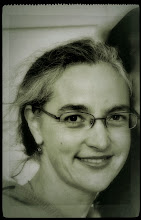The boys and I decided to take the city bus to the Exploratorium. We boarded the transit four blocks from my sisters home in the Dogpatch and slowly rolled across the city.
I hoped that my children would taste the more complex flavors of city life by viewing San Francisco from the vinyl seats of public transportation. I hoped they would begin to get a sense of what "multicultural" means. (In Eugene, people of color are so rare that their appearance sometimes scares the dog.)
In our first ten minutes, a large black woman boarded the bus with her iphone blaring. I marveled at the sound she coaxed from that little machine. My iphone has never projected so well. I sat for several minutes bearing witness to her rap concert while other thoughts leapt from every available window in my head. Soon, it became clear that I could hold no interior conversation, harbor no dream or plan of my own in the presence of music at that volume.
I considered my options. Would I ask her to turn it down? I imagined that the request would not be warmly received. I expected that I would likely be seen as another white person demanding that my needs be considered first.
I understood and had compassion for such a response. How many generations had black people passed down the suffering of white domination in this country? I trusted that my family had certainly taken part in this grief-making, though the record of it was lost to me. I accepted responsibility for this, even as black people today shoulder the burden of pain passed down by nature and nurture and live their lives beneath the implicit weight of it.
I felt terribly sad thinking of the ways that cruelty has shaped black culture and opportunity across generations so that people of different colors who have never met could be perceived as enemies without even meeting. I mourned the pain that countless people of color have endured, the native cultures lost, and the struggle that many experience now to get their basic needs met in the fallout of a history of explicit and implicit discrimination.
I sat with that and made my peace silently. Several minutes rolled by. My children stared out the window. The bus filled. A few white people cast disgusted looks in the direction of the iphone which continued to erupt with expletives that I doubted that my children fully grokked.
A new thought emerged. What if I asked her to turn it down just so I could have the opportunity to connect? The request risked discomfort on both of our parts, but what if I was successful and a bridge was built? That bridge could be crossed by more than just she and I -- it might extend with good will on the next bus ride and the next. My children might see the model and brave the opportunity to connect with someone else who seemed similarly separate. The effects could be statistically significant. And best of all, I liked the challenge and the opportunity to see the heart of someone else apparently marooned in the seat across from me.
"Excuse me," I said. "I'm having trouble thinking with your iphone at that volume. Would you be willing to turn it down just a little?"
"No way, lady! Listen, I play my music at the volume I want to play it at and nobody's goin' to tell me what to do with it. This here's a public place, and I can listen to whatever I like!"
"Amen, sister," said a large black man slumping in the seat behind her.
"I want you to listen to whatever you like," I said. "I just wondered if you would be willing to turn it down to support me thinking my own thoughts, too. I see you aren't willing, and I'm okay with that."
"There ain't no foul language in this music. I know, because I have a kid of my own. The only people I'm willing to turn it down for are kids." At this point, she leaned forward and extended her hand toward my boys.
"You alright, babies?" she asked. They nodded quickly and emphatically.
"Y'see? They fine," she said, sitting back. "Now, I've had a really tough day, and I will listen to what I damn well please to listen to."
"Sure," I said. "I'm sorry you've had a tough day. Music helps, huh?"
"Yeah, I'll turn it down in a minute," she said and within a couple of seconds she began to press at the volume control with her thumb.
"No, don't do it!" called the black man behind her. "It's
your god damned music!"
"Oh, thank you, brother, thank you," she said warmly. "This lady, she asked me so nicely. I'm happy to do it. Thank you, though."
"How old's your son?" I asked.
"Oh, he's fifteen now. And I always listened to all kinds of music around him. I played Mozart when I was pregnant. You never know what kids will like and maybe even want to play -- you might have the next Eminem over there," she said nodding to my towheaded children.
"Never know," I agreed.
"This my stop, honey, so I'll see you later," she said, scooping up her things and pulling the cord. The bus jounced to a halt and the woman's body pressed hard into the bar she held from above.
"'Scuse me!" she said with a smile to the man beside her, and she stepped down from the bus.
As we sped northward, a heavily pierced white woman two rows ahead of me said to her partner, "Well, at least
someone is happy."
Now, that's my kind of ending.

